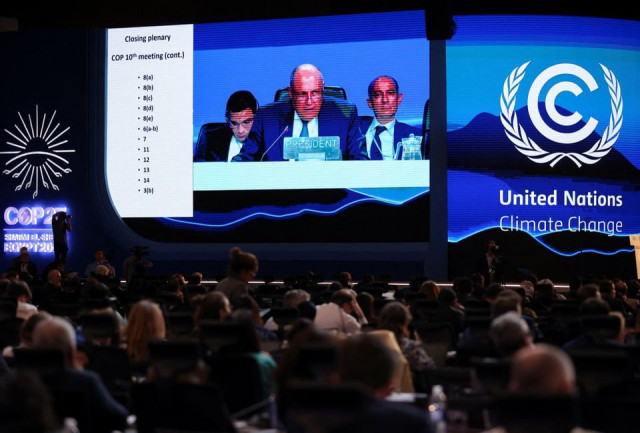Rich nations agree to pay on climate
In first step towards climate justice, COP27 sets up Fund for Loss and Damage

A fraught UN summit wrapped up on Sunday with a landmark deal on funding to help vulnerable countries cope with devastating climate impacts—but also anger boiled over a failure to be more ambitious on cutting emissions.
The two-week talks in Egypt’s Red Sea resort of Sharm el-Sheikh, which at times appeared to teeter on the brink of collapse, delivered a major breakthrough on a fund for climate “loss and damage” at dawn on Sunday.
Pakistan welcomed the historic decision of the 27th summit of the United Nations Conference of Parties (COP27) for establishing the fund, terming it momentous achievement, especially for the Group of 77 (G77) countries, who were pressing for such a measure for the past three decades.
“We have struggled for 30 years on this path, and today in Sharm el-Sheikh this journey has achieved its first positive milestone,” Pakistan’s Climate Minister Sherry Rehman told the summit. COP27 “responded to the voices of the vulnerable”.
Tired delegates applauded when the fund was adopted as the sun came up on Sunday, following almost two extra days of round-the-clock negotiations. But jubilation over that achievement was countered by stern warnings.
UN Secretary General Antonio Guterres said the talks had “taken an important step towards justice” with the loss and damage fund, but fell short in pushing for the urgent carbon-cutting needed to tackle the global warming.
British Prime Minister Rishi Sunak also warned that “more must be done”, while French President Emmanuel Macron proposed another summit in Paris ahead of COP28 in Dubai to agree “a new financial pact” for vulnerable nations.
A final COP27 statement covering the broad efforts to grapple with a warming planet held the line on the aspirational goal of limiting global warming to 1.5 degrees Celsius from pre-industrial levels.
It also included the language on renewable energy for the first time, while reiterating previous calls to accelerate “efforts towards the phase-down of unabated coal power and phase-out of inefficient fossil fuel subsidies”.
European Commission Vice President Frans Timmermans said the EU was “disappointed”, adding that more than 80 nations had backed a stronger emissions pledge. “What we have in front of us... doesn’t bring enough added efforts from major emitters to increase and accelerate their emission cuts,” said Timmermans.
The deal on loss and damage gathered critical momentum during the talks. The COP27 chair, Egyptian Foreign Minister Sameh Shoukry, said any missteps were “not intentional”, and that he worked to avoid any “backslide” by parties.
With around 1.2C of warming so far, the world has seen a cascade of climate-driven extremes, shining a spotlight on the plight of developing countries faced with escalating disasters, as well as an energy and food price crisis and debt.
The fund will be geared towards developing nations “that are particularly vulnerable to the adverse effects of climate change”—language that had been requested by the EU.
The Europeans had also wanted to broaden the funder base to cough up cash. The final loss and damage text left many of the thornier questions to be dealt with by a transitional committee, which will report to next year’s climate meeting in Dubai to get the funding operational.
The fund will focus on what can be done now to support loss and damage resources but the agreement does not provide for liability or compensation, said a US State Department spokesperson.
The establishment of the fund is seen as major diplomatic achievement of Pakistan which, as chair of the Group of 77 and China, galvanised international support for not only placing the issue on the agenda of the talks in in Egypt, but also pushed for a consensus agreement.
The Foreign Office said in a statement that the consensus decision taken to this effect by the COP27 in Egypt was a momentous achievement, especially for the Group of 77 and China, as the developing countries had been demanding such a fund for the past 30 years.
“Pakistan welcomes the establishment of a fund to address loss and damage caused by climate-induced disasters,” the Foreign Office said in a statement. “The developing countries have been demanding such a fund for the past 30 years,” the statement added.
Referring to the catastrophic climate-induced floods in Pakistan that resulted in damages of over $30 billion, the Foreign Office expressed the hope for an early operationalisation of the fund to bridge a major gap in the climate finance architecture.
Prime Minister Shehbaz Sharif termed the establishment of the fund the “first pivotal step” towards the goal of climate justice. “It is up to the transitional committee to build on the historic development,” the prime minister wrote in a Twitter post.
According to a statement issued by the Prime Minister’s Office, the COP27 made history by taking a practical step comparing the Paris Accord and Green Marshal Plan. Prime Minister Shehbaz also appreciated Climate Change Minister Sherry Rehman and other members of the Pakistan delegation at COP27 for their hard work.
Foreign Minister Bilawal Bhutto Zardari, said that the establishment of the fund and financial arrangements to address the issue of climate justice, was a “major win” for Pakistan and all of the developing world. “This is a major win for Pakistan and all of the developing world,” he said in a statement.
The two-week Sharm el-Sheikh summit has been seen as a test of global resolve to fight climate change – even as a war in Europe, energy market turmoil and rampant consumer inflation worldwide distract international attention.
Billed as the “African COP”, the summit in the Red Sea resort had promised to highlight the plight of poor countries facing the most severe consequences from global warming caused mainly by wealthy, industrialised nations.
The approved deal did not contain a reference requested by India and some other delegations to phase down the use of “all fossil fuels”. It instead called on countries to take steps toward “the phasedown of unabated coal power and phase-out of inefficient fossil fuel subsidies,” as was agreed at the COP26 Glasgow summit.



















COMMENTS
Comments are moderated and generally will be posted if they are on-topic and not abusive.
For more information, please see our Comments FAQ